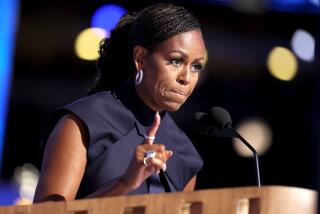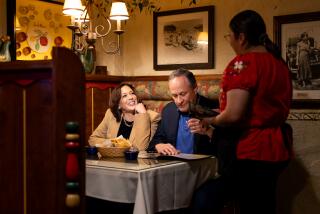Michelle Obama -- in the kitchen?
- Share via
WASHINGTON — Michelle Obama joined White House chefs Sunday afternoon for a public preview of the state dinner that night, praising the kitchen’s huckleberry pie and confessing that, yes, she might even do the traditional duty of coming up with her own china.
“I think that’s part of the job,” she said, sliding in a joke about the challenge the White House kitchen has in getting her daughters to eat anything green.
Many of Obama’s early public appearances are making the new first lady look a lot like the new “first mom.”
She has flopped down on a classroom floor to read books to children. She has scheduled games for her daughters’ parties. Every afternoon, when Sasha and Malia get home from school, she is there to meet them.
Is that who Michelle Obama will turn out to be as first lady? Is her goal to become a symbol of the traditional wife and mother? Given her high-powered background -- Harvard-trained lawyer, senior executive in one of the country’s major medical care centers -- many Washington veterans think the answer is no.
Eventually, Michelle-watchers say, she will seek a larger role, one that offers more direct involvement in major issues and policies. But at the start she’s playing it cautious, mindful of the missteps that have ensnared some of her predecessors.
“She is looking and learning, and isn’t going to make the same mistakes because she’s aware of what the mistakes were,” said Letitia Baldridge, the author who served as social secretary to Jacqueline Kennedy.
“She doesn’t have to burst forth like a night-blooming flower at midnight. . . . And she’s going to end up having enormous influence because of it.”
Historically, the role of first lady has been largely what the individuals chose to make it. Barbara Bush, wife of President George H.W. Bush, was something close to first grandmother, doting on the families of her grown children and famously telling women at Wellesley College that careers were evanescent but they would never regret hours spent with their families.
Kennedy was a primary source of the style and elegance that made many Americans see her husband’s brief presidency as Camelot.
Yet if first ladies can largely write their own job descriptions, some choices have worked out better than others. During the 1992 presidential campaign, Hillary Rodham Clinton scorned the traditional candidate’s wifely image of baking cookies and hosting tea parties.
Then, as first lady, she barreled straight into the role of “co-president” and directed a major push for healthcare reform that turned into a political disaster for her husband in his first term.
Rosalynn Carter, on the other hand, was one of President Carter’s most trusted confidants but seldom let that side of her role show. In public, she focused on promoting education and mental health care, much the way Laura Bush established herself in the public eye as first librarian.
Now it’s Michelle Obama’s turn. Her staff does not explicitly acknowledge that they are mindful of Clinton’s path -- although a decade and a half after the healthcare debacle, the former first lady and now-secretary of State obviously has recovered. Still, as Obama staffers contemplate her political and policy role, they are very obviously doing so from the safety of the well-trodden path.
“You have this undefined role of first lady,” said Jackie Norris, Obama’s chief of staff. “She wants to think about how to be the hostess, but are there other things she can do to help the dialogue?”
It’s not just that she has the Hillary Clinton example to learn from. She’s from a generation of working women who have often insisted on having fulfilling lives at home too, and she espouses a “work-life balance” message.
“No question about it, Michelle Obama will launch something significant,” said Carl Sferrazza Anthony, a historian at the National First Ladies’ Library and author of several books on presidential spouses.
In fact, he said, Obama may be in a position to do exactly what Clinton couldn’t -- sell the idea of healthcare reform. After all, if her husband doesn’t bring it about, many supporters will perceive it as a major failure to deliver on a promise.
She is well versed on the issue. Before the campaign shifted into high gear, Obama was an executive at the urban hospital network of the University of Chicago.
“She has a very practical, hands-on understanding of the reality of the healthcare crisis,” Anthony said. “She could be a very powerful spokesperson for healthcare reform.”
Obama has the power to speak for the administration, said Arne Duncan, the former Chicago public schools chief who now serves as Education secretary.
“She expresses the values and priorities, and how this administration is going to treat people,” Duncan said. “There’s a tremendous amount that can be learned about this administration from moments like that.”
--



